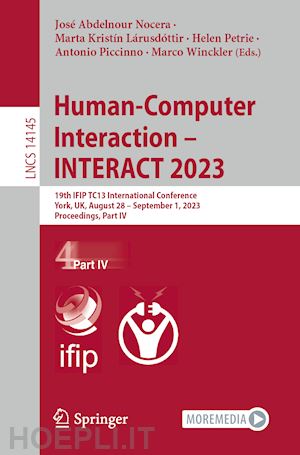User Studies.- Comparing Perceived Restorativeness and Stress Reduction in Virtual Reality Environments using Abstract Fractal Geometries versus Realistic Natural Landscapes.- “I miss going to that place”: The impact of watching nature videos on the well-being of informal caregivers.- Our Nudges, Our Selves: Tailoring Mobile User Engagement Using Personality.- Turn & Slide: Designing a Puzzle Game to Elicit the Visualizer-Verbalizer Cognitive Style.- User Studies, Eye-Tracking, and Physiological Data.- Electroencephalographic (EEG) correlates of Visually Induced Motion Sickness (VIMS) in the Virtual Reality (VR) based simulations.- Exploring Eye Expressions for Enhancing EOG-Based Interaction.- How Many Participants Do You Need for an Open Card Sort? A Case Study of E-commerce Websites.- Quantifying Device Usefulness - How Useful is an Obsolete Device?.- Usability Evaluation of a Brazilian Dam Safety Data Exploration Platform: a Consolidation of Results from User Tests and Heuristic Evaluation.- Virtual Reality.- Asymmetric communication in virtual reality: designing for presence, effectiveness, and enjoyment.- Digital Modeling for Everyone: Exploring How Novices Approach Voice-Based 3D Modeling.- Exploring the Potential of Metaverse Apps for Real-World Applications: A Case Study with CALEND_AR.- PeriFocus - Training Peripheral Color- and Shape Detection in Virtual Reality.- Supporting Resilience Through Virtual Reality: Design and Preliminary Evaluation of a VR Experience Based on Viktor Frankl’s Logotherapy.- Virtual Reality and Training.- A Case Study Using Virtual Reality to Prime Knowledge for Procedural Medical Training.- Mind the Heart: Designing a Stress Dashboard Based on Physiological Data for Training Highly Stressful Situations in Virtual Reality.- VR for HR – a Case Study of Human Resource Development Professionals using Virtual Reality for Social Skills Training in the Workplace.- Courses.- Disability, Design and Innovation for a Fairer World.- Hacking the Brain: the risks and challenges of Cognitive Augmentation.- How to Assess Human Reliance on Artificial Intelligence in Hybrid Decision-Making.- Introduction to Information Visualisation.- The UCD Sprint: Bringing Users Along to Sprint.- Industrial Experiences.- How to Bring Diversity into Industry: Industrial Experiences in Public Transport Repair & Maintenance.- Whose responsibility is accessibility in games anyway? Everyone.- Interactive Demonstrations.- A Toolkit for Human-Centred Engineering: an Experience with Pre-teens.- Color Blind: A Figma Plugin to Simulate Colour Blindness.- Comfort Management Through a Universal Wheelchair Dashboard.- Dataslip: How Far Does Your Personal Data Go?.- Ingá Telikit: A Virtual Reality Game for Learning Penan’s Hunting Techniques.- StoryCarnival: Inspiring Play with Stories and an Enhanced Puppet.- Together Porting: Multi-user Locomotion in Social Virtual Reality.- Towards “Image Reflow” on the Web: Avoiding Excessive Panning of Magnified Images by Multiplexing Automatically Cropped Regions of Interest.- Two Domain-Specific Languages for Controlling a Humanoid Robot in a Therapeutic Context.- Using polymorphic glyphs to support the visual exploration of hierarchical spatio-temporal data.- Keynotes.- A Framework for Born-Accessible Development of Software and Digital Content.- Why we do what we do – HCI and societal impact.- Panels.- A Multi-Perspective Panel on User-centred Transparency, Explainability, and Controllability in Automations.- Ethical Value Exchange in HCI.- Posters.- A Comparative Analysis of Multi-Object Animation with Motion Paths in Virtual Reality.- A Human-Robot Conversation Interface for Children with ASD.- A Literature Review on Positive and Negative Effects of Interruptions and Implications for Design.- A new interactive paradigm for speech therapy.- A simple evaluation framework for enhanced usability and accessibility of Cultural Heritage Information Systems.- A Study on Prototyping in a Design Course.- A Theoretical Framework For The Development of “Needy” Socially Assistive Robots.- AllyChat: Developing a VR Conversational AI Agent Using Few-Shot Learning to Support Individuals with Intellectual Disabilities.- An Approach to Evaluate User Interfaces in a Scholarly Knowledge Communication Domain.- Are Italian and French Public University Websites Sustainable?.- Are You Okay? Development of Electronic Check-in Systems for Isolated Older Adults.- Availability for Work, Family, and Leisure: An Empirical Study.- Better Real-Life Space Utilization in VR Through a Multimodal Guardian Alternative.- Building Teamwork: Mixed Reality Game for Developing Trust and Communication.- Coding with colors: Children’s errors committed while programming Robotito for the first time.- Design and development of an immersive Virtual Reality application to reduce anxiety in young adults.- Designing AR Applications for People Living with Dementia.- Designing Interaction to Support Sustained Attention.- Digital Educational Games with Storytelling for Students to Learn Algebra.- Distinguishing user paths for personas and stakeholders through motives and decision making.- Embodied PointCloud: Combining Embodied Avatars with Point Clouds to Represent Users in VR Remote Meetings.- Enhancing Learnability with Micro Teachings.- Exploring Responsible AI Practices in Dutch Media Organizations.- Exploring Users’ Ability to Choose a Proper Fit in Smart-Rings: A Year-Long “In the Wild” Study.- Heuristics to design trustworthy technologies: study design and current progress.- Infuences of Cognitive Styles on EEG-based Activity: An Empirical Study on Visual Content Comprehension.- Interactive 3D printed urban maps for blind people.- Interactive Visualization of Sport Climbing Data.- Interactors, not users! Towards a neutral interaction design.- Lessons Learned from Designing and Implementing Interaction Mechanics for Viewer Participation in Game Streaming.- Mapping The Digital Injustices of Technology-Facilitated Sex Trafficking.- MetaCUX: Social Interaction and Collaboration in the Metaverse.- Multisensory Climbing in the Magic Room.- News Bulletins Supporting Human Memory.- PECSOnline: A Bespoke Classroom Based Picture Exchange Communication System (PECS) for Children with Autism.- Prediction of Love-Like Scores after Speed Dating based on Pre-obtainable Personal Characteristic Information.- SamS-Vis: A Tool to Visualize Summary View using Sampled Data.- They need to know and learn –Gamified Social Communication Framework for Adolescent Reproductive Health and Well Being.- Towards Cross-Cultural Assessment of Trust in High-Risk AI.- Towards Enhancing the Media Industry through AI-Driven Image Recommendations.- Using virtual reality to investigate the emergence of gaze conventions in interpersonal coordination.- What’s in a Name? How Perceived Music Playlist Personalization Influences Content Expectations.- Where do all Stakeholders find the Software Product Blueprint?.- Why Choose You? - Exploring Attitudes Towards Starter Pokémon.- Wokshops.- Algorithmic affordances in recommender interfaces.- Co-Designing Immersive Virtual and Extended Reality Systems for Remote and Unsupervised Interaction, Intervention, Training and Research.- Designing for Map-based Interfaces and Interactions.- Designing Technology for Neurodivergent Self-Determination: Challenges and Opportunities.- HCI for Digital Democracya











